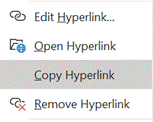|
In most email programs, in Word, and even in the new Yammer experience and some other web forum software, selecting some text and pressing CTRL-K lets you insert a URL under that text – so rather than saying “Flight Simulator – https://www.xbox.com/en-US/games/microsoft-flight-simulator”, you could just write “Flight Simulator”.
When it comes to sharing URLs with other people, though, you might still need the native URL
The first URL Shortening service was launched in 2002, tinyurl.com (and doesn’t the website look like a 2002 site?). The basic idea was that instead of having a 200-character URL, you could generate something that would have the form of the tinyurl domain and a random series of characters, such as https://tinyurl.com/yxtj4gft. When the user clicks the link, their browser goes to the TinyURL website and is then provided the full link to follow, and redirects to that. The primary benefit was to make it easier to share the URL, even if it’s not so memorable, however the developers later added the ability to provide a custom redirect name and, as long as nobody else has nabbed it first, you can use it – eg https://tinyurl.com/yammerofficespace. TinyURL has been overtaken by others, notably bit.ly, which Twitter switched to from having previously used TinyURL, and before later launching its own t.co. There are many others too, some connected with existing services – like the onedrive.com shortener (eg https://1drv.ms/u/s!AgMogCiKiWDFraIfifRzFKdjw4F1uQ?e=Yepjwh) which isn’t really very short, and which causes Bit.ly to get its Alans in a twist, as it seems it doesn’t like to shorten another shortener’s link.
There are some downsides to using this kind of service, potentially. What happens if the provider goes bust, or decides to start charging users where it was once free? Sites like Photobucket which started free but began charging users a “ransom” get internet warriors hot under the collar, but so far, sites like TinyURL and it’s progeny are mostly still free to use, with the operators selling aggregate data about the referrals being followed to fund their operations costs. Some shorteners decide to close down – like goo.gl – meaning there’s a risk that previously-shared short URLs won’t work in future (though in the case of Google’s shortener, they are keeping old links alive, just not allowing any new ones to be created). Similarly, if a shortener has a technical problem or security breach, it could affect the way it works – TinyURL reportedly having problems just this week.
All aka.ms links are by definition publicly accessible, but many are used to get access to sites that are for internal use, even though they exist beyond the firewall – Sharepoint sites, for example, or the intranet homepage, aka.ms/msw. Anyone could resolve the destination URL – even en masse as one enterprise developer has done, using Azure functions – but you still need to provide appropriate credentials to access the destination site. |



